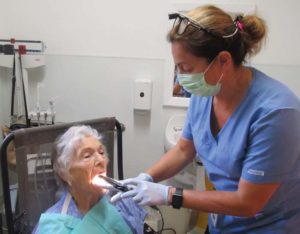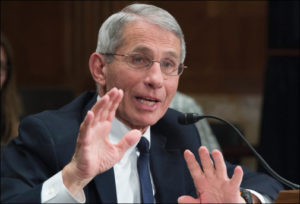 Volume 393, Number 10175
Volume 393, Number 10175
9 March 2019
WORLD REPORT A committee brought together Senators and drug company representatives to discuss why drug pricing in the USA is so high, but little progress was made, Susan Jaffe reports.
 Volume 393, Number 10175
Volume 393, Number 10175
9 March 2019
WORLD REPORT A committee brought together Senators and drug company representatives to discuss why drug pricing in the USA is so high, but little progress was made, Susan Jaffe reports.
 Volume 393, Number 10172
Volume 393, Number 10172
16 February 2019
WORLD REPORT The unexpected announcement in the State of the Union address could set the start of a realistic agenda to end HIV/AIDS in the USA, provided funds are secured. Susan Jaffe reports.
Nearly an hour into his 90 min State of the Union address, President Donald Trump called for a government-run health-care programme “to eliminate the HIV epidemic in the United States within 10 years”.
Although the president has promised to get rid of the Affordable Care Act (ACA) along with its health insurance marketplaces and Medicaid expansion, these and other policies did not appear to dampen his enthusiasm. [Continued here.]…
WASHINGTON — Pharmaceutical companies were pummeled during Tuesday’s hearing of the House Committee on Oversight and Reform. The panel’s first hearing of the 116th Congress examined the reasons for rising drug prices and follows committee chairman Elijah Cummings’ (D-Md.) launch of an aggressive investigation into pharmaceutical pricing issues.
 “For the past decade I’ve been trying to investigate the actions of drug companies for all sorts of drugs — old and new, generic and brand name,” Cummings said. “We have seen time after time drug companies make money hand over fist by raising the prices of their drugs often without justification…” [Continued at MedPageToday]
“For the past decade I’ve been trying to investigate the actions of drug companies for all sorts of drugs — old and new, generic and brand name,” Cummings said. “We have seen time after time drug companies make money hand over fist by raising the prices of their drugs often without justification…” [Continued at MedPageToday]
For some older adults, private Medicare Advantage plans next year will offer a host of new benefits, such as transportation to medical appointments, home-delivered meals, wheelchair ramps, bathroom grab bars or air conditioners for asthma sufferers.
But the new benefits will not be widely available, and they won’t be easy to find.
Of the 3,700 plans across the country next year, only 273 in 21 states will offer at least one. About 7 percent of Advantage members — 1.5 million people — will have access, Medicare officials estimate.
 That means even for the savviest shoppers it will be a challenge to figure out which plans offer the new benefits and who qualifies for them.
That means even for the savviest shoppers it will be a challenge to figure out which plans offer the new benefits and who qualifies for them.
Medicare officials have touted the expansion as historic and an innovative way to keep seniors healthy and independent. Despite that enthusiasm, a full listing of the new services is not available on the web-based “Medicare Plan Finder,” the government tool used by beneficiaries, counselors and insurance agents to sort through dozens of plan options. [Continued at Kaiser Health News, NPR and CNN]…
 For years, most pharmacists couldn’t give customers even a clue about an easy way to save money on prescription drugs. But the restraints are coming off.
For years, most pharmacists couldn’t give customers even a clue about an easy way to save money on prescription drugs. But the restraints are coming off.Some physicians and patient advocates are concerned that the pursuit of lower Part B drug prices could endanger very sick Medicare Advantage patients if they can’t be treated promptly with the medicine that was their doctor’s first choice.
Starting next year, Medicare Advantage plans will be able to add restrictions on expensive, injectable drugs administered by doctors to treat cancer, rheumatoid arthritis, macular degeneration and other serious diseases.
Under the new rules from Medicare, these private Medicare insurance plans could require patients to try cheaper drugs first. If those are not  effective, then the patients could receive the more expensive medication prescribed by their doctors.
effective, then the patients could receive the more expensive medication prescribed by their doctors.
Insurers use such “step therapy” to control drug costs in the employer-based insurance market as well as in Medicare’s stand-alone Part D prescription drug benefit, which generally covers medicine purchased at retail pharmacies or through the mail. The new option allows the private Medicare plans — an alternative to traditional, government-run Medicare — to extend that cost-control strategy to these physician-administered drugs.
…Critics of the new policy, part of the administration’s efforts to fulfill President Donald Trump’s promise to cut drug prices, say it lacks some crucial details, including how to determine when a less expensive drug isn’t effective. [Continued at Kaiser Health News and NPR]
…
 Volume 392, Number 10149
Volume 392, Number 10149
1 September 2018
WORLD REPORT The single-payer national health-care bill, so-called Medicare for All, is gaining momentum with the public but is stalling in Congress. Susan Jaffe, The Lancet‘s Washington correspondent, reports.
…
Sometimes a drug plan’s copay is higher than the cash, but insurers’ “gag orders” keep pharmacists from telling Medicare beneficiaries. A little-known Medicare rule requires pharmacists to divulge the lower cash price if patients ask.
As part of President Donald Trump’s blueprint to bring down prescription costs, Medicare officials have warned insurers that “gag orders”

Scott Olson/Getty Images
keeping pharmacists from alerting seniors that they could save money by paying cash — rather than using their insurance — are “unacceptable and contrary” to the government’s effort to promote price transparency.
But the agency stopped short of requiring insurers to lift such restrictions on pharmacists.
That doesn’t mean people with Medicare drug coverage are destined to overpay for prescriptions. Under a little-known Medicare rule, they can pay a lower cash price for prescriptions instead of using their insurance. But first, they must ask the pharmacist about that option…. [Continued at Kaiser Health News, NPR and CNN Money]…
 Volume 391, Number 10136
Volume 391, Number 10136
2 June 2018
WORLD REPORT The president’s wide-ranging plan to reduce prescription drug prices won’t be easy to achieve, experts say. Susan Jaffe, The Lancet’s Washington correspondent, reports.
“We will have tougher negotiation, more competition, and much lower prices at the pharmacy counter. And it will start to take effect very soon“, said President Donald Trump.
How soon will depend on what steps the administration takes on its own, through regulations and other mandates, and what changes can only be achieved through new laws enacted by Congress, which will increasingly be preoccupied by November’s election. [Continued here.]…
Last month’s budget deal means Medicare beneficiaries are eligible for physical and occupational therapy indefinitely. Plus, prescription drug costs will fall for more seniors.
Physical therapy helps Leon Beers, 73, get out of bed in the morning and

Leon Beers gets help from caregiver Timothy Wehe. (Bert Johnson for KHN)
maneuver around his home using his walker. Other treatment strengthens his throat muscles so that he can communicate and swallow food, said his sister Karen Morse. But in mid-January, his home health care agency told Morse it could no longer provide these services because he had used all his therapy benefits allowed under Medicare for the year.
… Under a recent change in federal law, people who qualify for Medicare’s [physical, occupational and speech] therapy services will no longer lose them solely because they used too much.
“It is a great idea,” said Beers. “It will help me get back to walking.” [Continued at Kaiser Health News, NPR and The Washington Post]
…
By Susan Jaffe | Kaiser Health News | Oct. 17, 2017 | This article also ran in  and
and ![]()
 noticed an uptick in mail solicitations from health insurance companies, which can mean only one thing: It’s time for the annual Medicare open enrollment.
noticed an uptick in mail solicitations from health insurance companies, which can mean only one thing: It’s time for the annual Medicare open enrollment.27 May 2017
WORLD REPORT Scott Gottlieb becomes commissioner of the FDA, as the agency’s role is threatened by an administration adverse to regulation. Susan Jaffe, The Lancet’s Washington correspondent, reports.
Only 6 months ago, Scott Gottlieb was still a resident fellow at the American Enterprise Institute, a co nservative thinktank, when he presented testimony to a US Senate committee investigating prescription drug prices. Before he began, he volunteered that he was “a reformed government bureaucrat, having worked at FDA [US Food and Drug Administration] for a number of years”. He blamed astonishing price hikes—500% in the case of Mylan’s EpiPen—on “regulatory failures stemming from FDA policy, and I think that policy can be fixed”.
nservative thinktank, when he presented testimony to a US Senate committee investigating prescription drug prices. Before he began, he volunteered that he was “a reformed government bureaucrat, having worked at FDA [US Food and Drug Administration] for a number of years”. He blamed astonishing price hikes—500% in the case of Mylan’s EpiPen—on “regulatory failures stemming from FDA policy, and I think that policy can be fixed”.
Gottlieb was sworn in as the 23rd commissioner of the FDA after being approved earlier this month by the US Senate, over the strong objections of most Democrats. Now Gottlieb will have a chance to fix a daunting array of policies. [Continued here] …
By Susan Jaffe | Kaiser Health News | December 14, 2016 | This KHN story also ran on ![]()
When Cindy Hunter received her Medicare card in the mail last spring, she said she “didn’t know a lot about Medicare.” She and her husband, retired teachers who live in a Philadelphia suburb, decided she didn’t need it because she shared his retiree health insurance, which covered her treatment for ovarian cancer.

Cindy Hunter, who is battling ovarian cancer, says she mistakenly thought she didn’t need to enroll in Medicare because her husband’s retiree insurance would cover her. (Steph Brecht/Courtesy of Cindy Hunter)
“We were so thankful we had good insurance,” she said. So she sent back the card, telling officials she would keep Medicare Part A, which is free for most older or disabled Americans and covers hospitalization, some nursing home stays and home health care. But she turned down Part B, which covers doctor visits and other outpatient care and comes with a monthly premium charge. A new Medicare card arrived that says she only has Part A.
Her story isn’t unique.
When Stan Withers left a job at a medical device company to become vice president of a small start-up near Sacramento, Calif., he took his health insurance with him. Under a federal law known as COBRA, he paid the full cost to continue his coverage from his previous employer. A few years earlier, when he turned 65, he signed up for
Medicare’s Part A. With the addition of a COBRA plan, he thought he didn’t need Medicare Part B.
Hunter and Withers now know they were wrong and are stuck with medical bills their insurance won’t cover. …Advocates for seniors and some members of Congress want to fix the problem, backed by a broad, unlikely group of unions, health insurers, patient organizations, health care providers and even eight former Medicare administrators. [Continued on Kaiser Health News or NPR or The Philadelphia Inquirer]…
Susan Jaffe | Washington Correspondent for The Lancet | 14 December 2016
The 21st Century Cures Act that President Barack Obama signed into law this week dedicates – but doesn![]() ‘t guarantee – billions of dollars to accelerating the discovery of new drugs and medical devices and getting them to patents more quickly, as well as supporting opioid addiction treatment and reforms in mental health care.
‘t guarantee – billions of dollars to accelerating the discovery of new drugs and medical devices and getting them to patents more quickly, as well as supporting opioid addiction treatment and reforms in mental health care.

President Barack Obama signs the 21st Century Cures Act, Tuesday, Dec. 13, 2016. (Photo by Susan Jaffe)
The overwhelming support for the law marks a stark contrast from the Affordable Care Act, another landmark health reform bill Obama signed in the second year of his presidency. Republicans promise to repeal it as soon as the new Congress convenes next month and Donald Trump is sworn in as president. But before the promised elimination of the ACA, Congress took nearly $5 billion from its Prevention and Public Health Fund to pay for most of the law.[Continued here.]
…
Since Medicare doesn’t cover most dental care, seniors often go without treatment.
By SUSAN JAFFE | Health Affairs | December 2016 | Volume 35, Number 12
The last time Evelyn Sell went to the dentist was nearly three years ago, when he told her his staff would no longer be able to lift her out of her wheelchair and into the dentist’s chair. “That really threw me for a loop,” said Sell, 87, a retired p reschool teacher who lives in Kingsley Manor, a retirement community in Los Angeles. “I didn’t know what I was going to do about dental care.”
reschool teacher who lives in Kingsley Manor, a retirement community in Los Angeles. “I didn’t know what I was going to do about dental care.”

Care at home: During a recent visit to Kingsley Manor, a Los Angeles, California, senior living community, dental hygienist Maria Ladd uses an intraoral camera to take photos of resident Ruth Wilson’s teeth. (Photo: Susanna Castillo)
…Then earlier this year, she found the solution. A flyer in her mail informed her that the management of her assisted living facility had partnered with the Virtual Dental Home project run by Pacific Center for Special Care at the University of the Pacific in San Francisco. Sell could have a dental hygienist come to her home. She was one of the first residents to sign up.
The project is one of several innovative demonstrations that providers and researchers are developing to serve vulnerable uninsured or underinsured patients. Despite their promise, however, these efforts meet only a fraction of the need. A comprehensive solution would likely require federal legislation, but bills to broadly expand Medicare’s dental coverage have languished in Congress. So some advocates for older adults are working on a third front, seeking changes to Medicare coverage policy based on the idea that dental care can be an integral part of the medically necessary care Medicare covers. [Continued here] …
Susan Jaffe | Washington Correspondent for The Lancet | 28th September 2016
By Susan Jaffe | Kaiser Health News | June 17, 2016 | This KHN story also ran on ![]()
A program that has helped seniors understand the many intricacies of Medicare as well as save them millions of dollars would be eliminated by a budget bill overwhelmingly approved last week by the powerful Senate Appropriations Committee.
The State Health Insurance Assistance Program, or “SHIP,” is among more than a dozen programs left out of the bill by the committee. Cutting these “unnecessary federal programs” helped provide needed funding for other efforts, Sen. Roy Blunt, R-Mo., chairman of the appropriations committee’s health and labor subcommittee, said in a statement last week.
Ending SHIP saves $52 million, which will help pay for a $2 billion increase for the National Institutes of Health, restore year-round Pell Grants, and increase resources to prevent and treat opioid abuse, among other things.
SHIP counselors are in every state, the District of Columbia and the U.S. territories offering free advice on how to choose from an array of drug and health insurance plans, challenge coverage denials, and receive financial subsidies for premiums, co-payments and deductibles. …Ohio’s SHIP program saved seniors $20.8 million in 2015 and was ranked first in the nation by the Department of Health and Human Services, the state’s lieutenant governor announced in February. [Continued on Kaiser Health News or NPR]
…
Three months after Vice President Joe Biden convened the first meeting of the Cancer Moonshot Task Force—aimed at accelerating ![]() cancer prevention, treatment and cures—he pleaded for help from people who know how to marshal massive amounts of health data to create successful businesses, or apps that can guide consumers to the best hospitals. [continued here]…
cancer prevention, treatment and cures—he pleaded for help from people who know how to marshal massive amounts of health data to create successful businesses, or apps that can guide consumers to the best hospitals. [continued here]…

Anthony Fauci
As the number of confirmed cases of people who have contracted the Zika virus increases across the globe, the growing knowledge about this once rare infection is not reassuring. “The more we learn, the more we get concerned”, said Anthony Fauci, director of the National Institute of Allergy and Infectious Diseases….
Representative Tom Cole, the Oklahoma Republican who is chairman of the House appropriations health subcommittee, said its questions about [President Barack Obama’s $1.9 billion Zika emergency funding] request are not unreasonable….“Let us do our job to make sure we do this as prudently as possible and we will get there”, he said. “Nobody thinks this is not a serious challenge”….
While clinical research and the funding debate continues, protection from the Zika virus will depend largely on avoiding the mosquitoes that carry it….
After years of cuts in federal and local funding for mosquito control, Zika is “a pretty major wake up call to rebuild those capacities”, said Lyle Petersen, director of CDC’s division of vector-borne infectious diseases. The virus is the latest “major pathogen that has come into the Americas” in recent years—after chikungunya, dengue fever, and West Nile virus—“and it won’t be the last.” [continued here] [listen to podcast here] …
Billionaire real estate developer Donald Trump’s unorthodox campaign to become the Republican presidential nominee has dominated the 2016 political race, nearly overshadowing some unconventional contenders on the Democratic side. The result is a political season that has defied the odds makers.
Former US Secretary of State and Senator from New York, Democrat Hillary Clinton may be well on her way to becoming the first woman in US history to win her party’s nomination for president. Vermont Senator Bernie Sanders, a self-proclaimed socialist, is trailing Clinton in the number of delegates needed to win the nomination. Yet his popular call for “a political revolution” continues to slowly raise his delegate count. [MORE]
…
Like many Americans, members of Congress are frustrated and angry about the huge spikes in prescription drug prices. While a congressional hearing held last week to investigate the practice united Democrats and Republicans in outrage, it did not reveal potential solutions.
![]() The unwilling star witness was Martin Shkreli, the former head of Turing Pharmaceuticals who was responsible for the company’s decision to raise the price of Daraprim, used to treat toxoplasmosis, a parasitic infection that affects HIV patients, from $13.50 to $750 a pill. [Continued here] …
The unwilling star witness was Martin Shkreli, the former head of Turing Pharmaceuticals who was responsible for the company’s decision to raise the price of Daraprim, used to treat toxoplasmosis, a parasitic infection that affects HIV patients, from $13.50 to $750 a pill. [Continued here] …
By Susan Jaffe | February 3, 2016 | Kaiser Health News in collaboration with Money magazine
Danny Thompson’s kidneys have failed and he needs a transplant but in some ways, he’s lucky: Both of his sons want to give him one of theirs, and his Medicare coverage will take care of most his expenses.

Danny Thompson (Heidi de Marco/KHN)
Yet the 53-year-old Californian is facing another daunting obstacle: He doesn’t
have the money for his share of the medical bills and follow-up drugs, and he can’t buy supplemental insurance to help cover his costs.
“It’s frustrating to be in the shape I’m in,” said Thompson, who depends on dialysis instead of his kidneys to cleanse his blood. “My plan is to get a transplant so I can go back to work.”
Almost one in four Medicare beneficiaries has such a policy, known as Medigap, which is sold by private insurance companies. It can help pay for costs Medicare doesn’t cover, including the 20 percent coinsurance required for medical expenses, including certain drugs, plus deductibles and co-payments. Those expenses have no out-of-pocket limit for beneficiaries.

This KHN story also ran on Money.
Federal law requires companies to sell Medigap plans to any Medicare beneficiary aged 65 or older within six months of signing up for Part B, which covers doctor visits and other outpatient services. If they sign up during this guaranteed open enrollment, they cannot be charged higher premiums due to their medical conditions.
But Congress left it to states to determine whether Medigap plans are sold to the more than 9 million people younger than 65 years old who qualify for Medicare because of a disability. [Continued in Kaiser Health News or Money magazine.]…
Susan Jaffe | Washington Correspondent for The Lancet | 13th January 2016
No single federal agency reviews US drug prices, but 51 members of the U. S. House of Representatives have discovered a 35-year-old law that allows the governme![]() nt to control huge hikes in drug costs. And they want the Department of Health and Human Services and National Institutes of Health (HHS) to use it. Earlier this week the group led by Texas Democrat Lloyd Doggett wrote to HHS Secretary Sylvia Matthews Burwell and NIH director Dr. Francis Collins to explain why. [Continued here]…
nt to control huge hikes in drug costs. And they want the Department of Health and Human Services and National Institutes of Health (HHS) to use it. Earlier this week the group led by Texas Democrat Lloyd Doggett wrote to HHS Secretary Sylvia Matthews Burwell and NIH director Dr. Francis Collins to explain why. [Continued here]…
